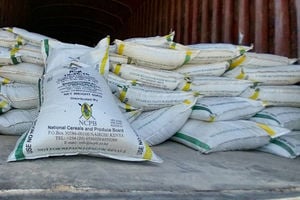Raila’s challenge is winning over sceptics on boycott plan

Nasa leader Raila Odinga (left) greets President Uhuru Kenyatta during the Centenary Celebration Service at All Saints' Cathedral Church, Nairobi, on November 6, 2017. Mr Odinga says he is fighting for the restoration of constitutionalism and electoral justice. PHOTO | PSCU
What you need to know:
- The Nasa strategy built around a National Resistance Movement hinges on the economic boycott and civil disobedience.
- If silent persuasion does not work, Nasa will be tempted to enforce the boycott by use of force in its strongholds.
On being a headline fixture, opposition leader Raila Odinga is master of the game.
It is not just his ardent fanatics who cannot keep his name off their lips, but even President Uhuru Kenyatta’s Jubilee Party diehards, who seem to do nothing else but talk and dream Raila, their worst nightmare.
Today, at every marketplace, in church, boardroom, street corner, funeral, Women’s Guild meeting, family gathering, and, of course, social media banter, Raila is the topic of discussion.
PRODUCT BOYCOTT
The big question now is whether the opposition’s economic boycott targeting three major companies will be anything more than a headline-grabbing stunt.
To the opposition supporters, the boycott is an ingenious move that will rattle the foundations of a conservative corporate sector in bed with the Jubilee regime to the point of acquiescence to electoral fraud and human rights abuses.
To the Jubilee faithful, it is yet another desperate and hopeless manoeuvre by a serial election loser wildly flailing out in an effort to remain relevant.
ELECTION
Still, they can’t help but spend every waking minute talking about him.
The consumer boycott is just one of a raft of measures announced by the National Super Alliance in the wake of President Kenyatta’s runaway victory against no opposition in the October 26 repeat presidential election.
The Nasa strategy built around a National Resistance Movement hinges on the economic boycott and civil disobedience.
More significant will be the convention of a ‘People’s Assembly’, that most likely will go the whole hog and declare itself an alternative sovereign to the Jubilee government.
SECESSION
Although not officially unveiled as a Nasa move, two governors at the Coast, Hassan Joho, of Mombasa, and Amason Kingi of Kilifi, have launched secession drives.
The opposition clearly wants to embark on the sort of campaign that uprooted the one-party system and toppled dictators elsewhere.
But there are real questions as to whether it is shooting from the hip.
The economic boycott provides a case in point.
SAFARICOM
Safaricom, Bidco and Brookside will obviously all be concerned about threats to their balance sheets.
Questions abound, however, on how the three were singled out.
Safaricom was allegedly complicit in the transmission of doctored election results in the first presidential election that was nullified by the Supreme Court.
Those details were never laid in evidence at the election petition.
KEPSA
Left unsaid was the obvious fact that Brookside was targeted principally because it is owned by the Kenyatta family, not for unspecified help it might have given the Jubilee campaign.
Bidco was likely targeted because the chief executive of the family-owned firm, Mr Vimal Shah, has been at the forefront of a campaign by the Kenya Private Sector Alliance, which Nasa interprets as part of a Jubilee narrative that emphasises peace above the imperative of justice.
The Nasa leadership might well believe that the three corporate behemoths need to be punished, but it will take a lot of effort to persuade a significant part of the population to voluntarily shun the targeted firms.
NYANZA
If silent persuasion does not work, Nasa will be tempted to enforce the boycott by use of force in its strongholds; as it successfully demonstrated in Nyanza to ensure there would be no voting during the repeat presidential elections.
Violence will, of course, attract a reaction from security agencies unschooled in the civil ways of managing unrest, provoking more anger and bitterness.
This, beyond the economic boycott, is what will make life very uncomfortable for President Kenyatta at the beginning of his contentious second term, and also keep Mr Odinga firmly in the news as a continuing scourge of the establishment. But to what avail and purpose?
DEMOCRACY
A factor that cannot be ignored is that the situation today is not quite a replica of the period of struggle against one-party dictatorship.
That popular campaign firmly held the moral high ground. The edifice was bound to crumble.
The difference this time is that President Kenyatta has his own claims to legitimacy, and his own ardent following that will not dissipate the way Mr Moi’s did.
Mr Odinga says he is fighting for the restoration of democracy, constitutionalism and electoral justice; but there are still many who need to be persuaded that he is not simply making a bid for power.
With the converts already won, Mr Odinga’s biggest challenge will be in preaching to the sceptics.
email: [email protected] Twitter: @MachariaGaitho





